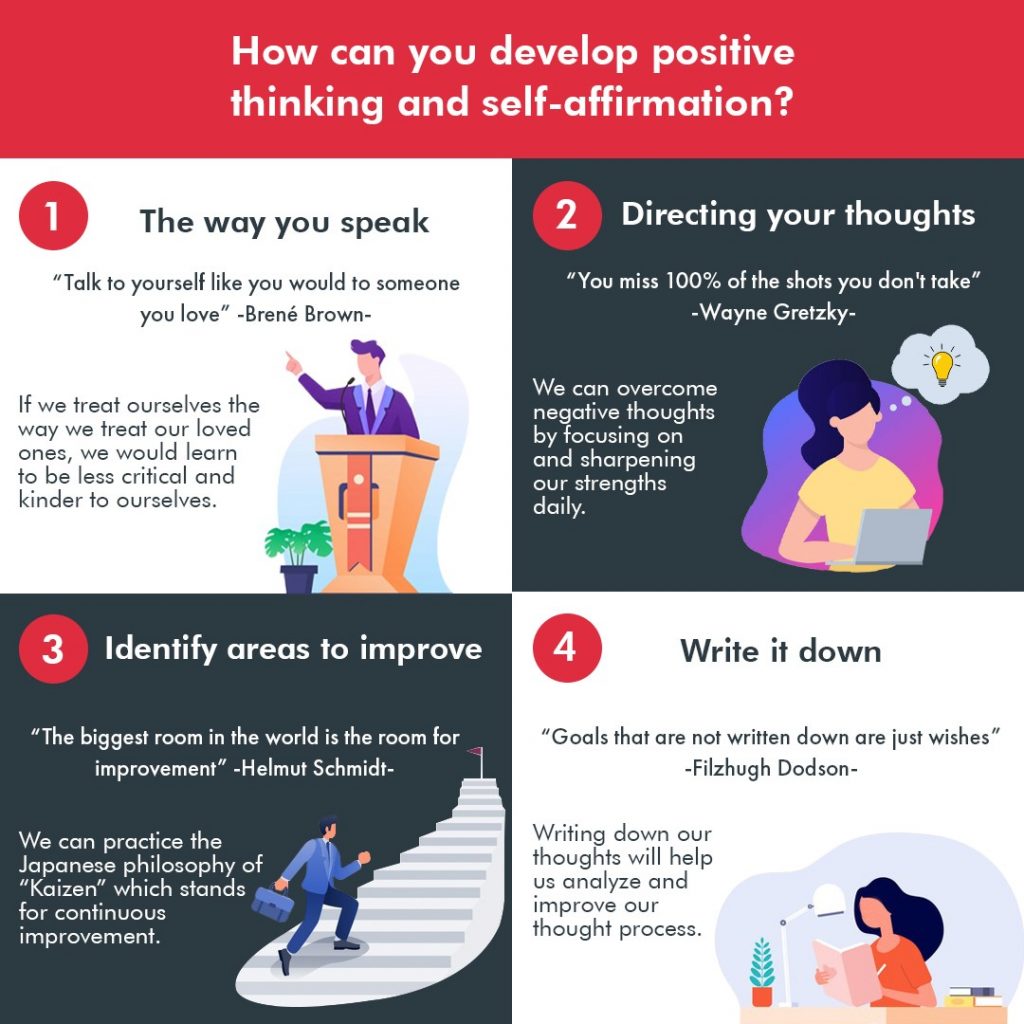“I feel like we tend to be our own worst critics” – An Na.
Often times we get bogged down with self-criticism and self-doubt forgetting our true value.
Our mindset plays a huge role in how we think, act and react. Having a positive mindset can help us gain back confidence whenever we’re feeling low and help us deal with challenges better.
Positive thinking or positive affirmation is one way to train your mind to focus on the good in any given situation. Positive thinking goes beyond being happy and cheerful and can help create a change in mindset to build value that can affect your mental and physical health.
Positive thinking can help you build an optimistic attitude to see the light in not only favourable situations but also in adverse ones.
People who have a positive frame of mind are way better at handling the stress and challenges that come along with day-to-day life.
Developing such a mindset overnight is not easy but certainly not impossible over time. Once you master it, you’ll have the world in the palm of your hands. It’ll help you build up your self-esteem and help you face any situation in life with the hope that everything will turn out to be okay in the end.
So how can you develop positive thinking and self-affirmation?
1. The way you speak
The way you speak to others and, most importantly, to yourself can help you adjust your mindset.
‘Talk to yourself like you would to someone you love’ – Brené Brown
If we treat ourselves the way we treat our loved ones, we would learn to be less critical and kinder to ourselves.
Not all results in life are what we expect them to be; however, acknowledging this will help reduce stress and calm us down when facing challenges.
For example, a thought like ‘I’ve never done this before’ can be shifted to ‘I can learn something new’.
Keep in mind that it’s not making light of the situation but teaching yourself to take on any challenge with a confident mindset and tackle any situation. One study has found self-affirmation can help improve problem-solving skills in chronically stressed individuals.
2. Directing your thoughts
The art of re-directing your negative thoughts into positive ones is a tough skill to master, but one which would bear great dividends. Being positive is not always easy; we are human after all. However, you can overcome these thoughts by focusing on your strengths and sharpening your strengths day by day.
Remember, life is a marathon, not a sprint. So pace yourself, and also be patient. All good things take time.
Let’s look at a real-life situation. If you’re applying for your dream job, the thought of ‘I am probably not qualified enough; there are others who would be way more skilled than me’ may prevent you from applying for the vacancy in the first place.
However, a shift in mindset to ‘I may not be fully qualified for the job now, but I am confident I’ll be able to learn and adapt to the job quickly’ could make you take the first step towards your goal.
Like the famous Wayne Gretzky quote goes ‘You miss 100% of the shots you don’t take”.
3. Identify areas to improve
You can start by working on identifying areas you want to improve on and develop on those areas. If an individual lacks time management skills, they might lack the motivation to complete the tasks on time and get overwhelmed.
However, identifying that the real problem is a lack of time management skills and not the ability to complete the task itself will go a long way in fixing the problem. Focusing on our strengths and figuring out how to use those skills to manage time better will help us get more done with less effort.
4. Write it down
Writing our goals down might sound cliché, but it will help us achieve them. Visualization is very powerful but is often overlooked. Writing down and reminding yourself of your goals daily will go a long way in making steady progress.
If this routine is practiced over time, you are most likely to generate positive thoughts automatically. Writing down your thoughts will also allow you to analyze these thoughts and see how you can change the thought process for the better.

Positive thinking can help us reprogram our thinking process and help us become the best version of ourselves. Adjusting your mindset will take time. But with practice and patience, you will learn how to see yourself in a positive light, be less critical of yourself and boost your self-esteem.
So, the answer to the question on the title is – ‘No positivity is not overrated, in fact, it is very much the opposite’. Always be kind to yourself.







